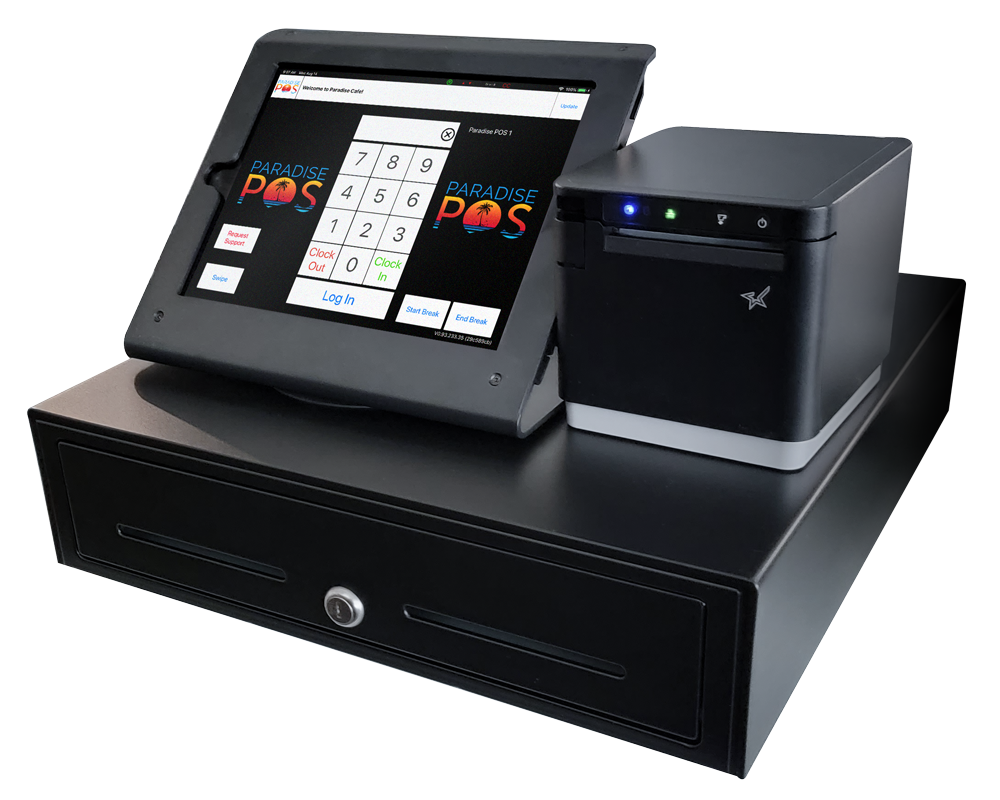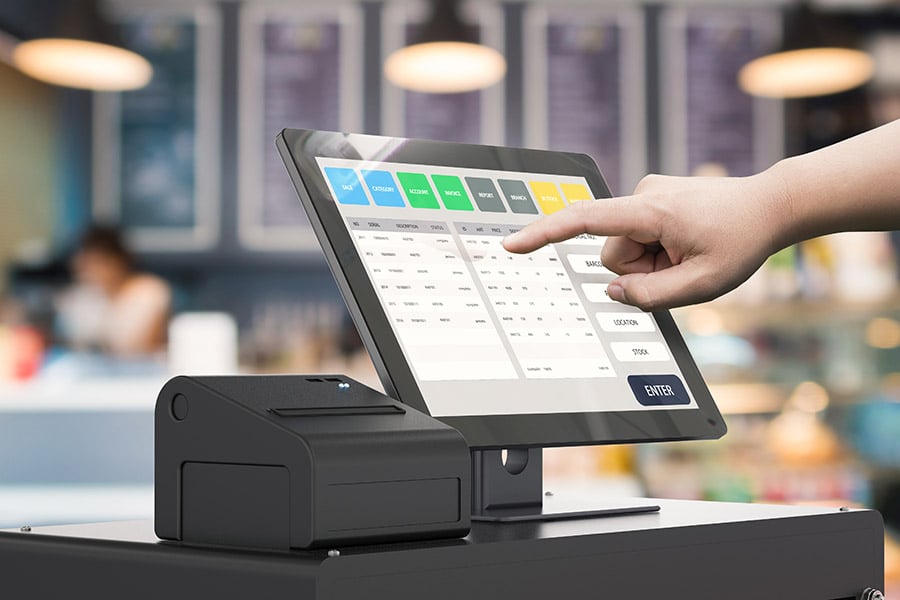Fascination About Pos Systems

POS: Retail Point-Of-Sale Solutions Streamline Transactions
What Does Pos System For Small Business Mean?

Hardware Elements of a Point of Sale System What makes a POS system tick? It's not simply software application; the hardware plays a starring role. Believe of it as the body to the software application's brain. Without the right hardware, even the most sophisticated POS software application is just a pretty face. Important POS Hardware So, what are the must-haves? Let's break it down. The main processing system, frequently a computer or tablet, is the heart of the operation. The screen or touchscreen show permits staff to connect with the system. A barcode scanner speeds up the checkout procedure. Keep in mind the days of manually going into each code? The reliable receipt printer offers clients with a record of their purchase. A cash drawer keeps your money safe and organized. A card reader permits customers to pay with credit or debit cards. Diving Deeper: Beyond the Fundamentals However wait, there's more! Depending on your business, you might need specialized hardware. A restaurant may include kitchen printers to relay orders, while a retail shop may utilize label printers for item tagging. Ever question how your regional bakery quickly prints those delicious-looking labels? Selecting the Right Hardware: A Balancing Act Picking the right hardware isn't just about purchasing the most expensive devices. It has to do with finding the sweet area in between functionality, sturdiness, and budget plan. A small company just starting out may select a more basic setup, while a high-volume seller will require robust, high-performance devices. Is it much better to purchase brand-new or used? Consider your choices carefully. A new system uses the most recent innovation and guarantee protection, but a refurbished system can save you cash. The Future of POS Hardware What does the future hold? Anticipate to see much more combination with mobile phones, biometric scanners for staff member authentication, and advanced analytics control panels showed on bigger, clearer screens. Envision a world where inventory is automatically updated in real-time as products are scanned-- a world where you can track your very popular item from throughout the world. The possibilities are unlimited, and the hardware is constantly developing to fulfill the demands of today's services. Are you all set to update your point of sale system?
Software Characteristics and Capabilities: The Heart of Your POS System
Ever see an experienced barista move through a hectic morning rush? Their trick isn't just caffeine; it's a seamless dance with their POS system. The software is the conductor of your company symphony, orchestrating whatever from sales to stock. What notes should you be listening for? What capabilities genuinely matter in today's market?
Inventory Management: Beyond Counting Beans
Forget spreadsheets that haunt your dreams. Modern POS systems offer real-time stock tracking, alerting you when your stock of artisanal coffee beans dips precariously low. Think of it as a digital guardian angel, preventing those awkward "Sorry, we're out!" minutes to consumers. What if you could likewise forecast need based on historic data? Lots of systems now use forecasting tools, a powerful weapon versus overstocking and lost sales. This helps avoid the dilemma of running out of popular items or building up excess stock of slow-moving items, both of which can constrain capital and area.
Sales Reporting and Analytics: Decoding the Information
Sales information is the brand-new gold, and your POS system is the miner. Forget simply knowing how much you sold today. Dive deep into the information to reveal patterns, recognize your best-selling items, and comprehend consumer behavior. Which menu product sets perfectly with the daily special? Which promotion resonated most with your clientele? These insights are not just fascinating; they're actionable intelligence. Without trustworthy sales reporting, browsing the intricacies of company decision-making ends up being like sailing without a compass, increasing the opportunity of missteps and missed out on chances.
Client Relationship Management (CRM): Building Bridges, Not Walls
Remembering a routine client's name and preferred order is charming, but scaling that personal touch is difficult. POS systems with CRM abilities permit you to track consumer purchase history, preferences, and even birthdays. Picture automatically providing a discount on their birthday-- a small gesture that fosters loyalty and encourages repeat company. However there is the possible snag of poor data quality, which can result in incorrect consumer profiles and inefficient marketing efforts.
Payment Processing: Enhancing the Transaction
The checkout experience can make or break a sale. Seamless integration with different payment techniques-- charge card, mobile wallets, even copyright-- is non-negotiable. Can your system manage split payments? Does it use protected tokenization to safeguard customer information? A cumbersome payment process is like striking a sour note in your business symphony, potentially disrupting the whole efficiency. Guaranteeing compatibility with developing payment innovations and adherence to security standards are vital for keeping customer trust and functional effectiveness.
Worker Management: Keeping the Team in Sync
From clocking in and out to managing approvals and tracking performance, employee management features streamline operations and enhance responsibility. Is scheduling a headache? Numerous POS systems provide incorporated scheduling tools, optimizing staffing levels based on anticipated need. A common barrier that is frequently overlooked is the challenge of incorporating employee management performances with payroll systems, which can result in errors and inadequacies in wage computations.
Advanced Features: Leveling Up Your Operations
- Table Management: Suitable for restaurants, this function allows you to imagine your dining-room, track table status, and handle bookings.
- Loyalty Programs: Reward your best customers and encourage repeat organization with integrated commitment programs.
- Online Purchasing Integration: Perfectly integrate your POS system with online buying platforms to expand your reach.
Selecting the ideal POS system has to do with more than simply functionality; it's about finding a partner that can grow with your business. Consider your present requirements, prepare for future development, and do not hesitate to ask the difficult concerns. The ideal software application can transform your service from a disorderly cacophony into an unified masterpiece.
Industry-Specific POS System Applications
Think of the regional bakery, bustling with early morning consumers yearning fresh croissants. A generic POS system might handle deals, however can it handle complicated recipes, track component stock, or instantly adjust production schedules based upon sales information? Probably not. That is where the charm of industry-specific POS systems shines.
Restaurants and Hospitality
For dynamic dining establishments, speed and accuracy are vital. How many times have you seen servers managing orders, adjustments, and splitting costs, all while trying to offer excellent service? A dining establishment POS system improves these procedures, permitting table management, kitchen area order tickets, and even online purchasing integration. These systems frequently include functions like ingredient-level inventory tracking, crucial for managing food expenses and minimizing waste. Ever question why your favorite meal is sometimes not available? It might originate from a lack of proper inventory management.
- Table Management
- Cooking Area Order Tickets
- Online Ordering Combination
- Ingredient-Level Inventory Tracking
Retail Solutions
Retail, with its diverse inventory and consumer interactions, demands a various set of tools. Imagine a shop clothing store having a hard time to keep track of sizes, colors, and seasonal collections utilizing a standard checkout system. An industry-specific retail POS system provides features like barcode scanning, client commitment programs, and comprehensive sales reporting. These systems can even incorporate with e-commerce platforms, supplying a smooth omnichannel experience for customers. Did you know some retail POS systems can forecast future sales patterns based upon historic data? Now that is powerful!
The Dangers of a Mismatch
Picking the wrong POS system can develop substantial operational obstacles. A clothing store using a dining establishment POS, for example, would discover it inappropriate for managing stock with sizes and colors. The lack of appropriate reporting and analytics could result in misinformed acquiring choices and lost income. The outcome might be comparable to trying to fit a square peg in a round hole.
Key Factors to consider
Picking an industry-specific POS system needs cautious evaluation. Think about your company's unique needs and functional workflows. Does the system incorporate with existing software? Does it offer the essential reporting abilities? Is it scalable to accommodate future growth? A well-chosen POS system is not just a deal tool; it's a tactical asset that can drive performance, enhance customer complete satisfaction, and eventually, boost your bottom line. Remember, it is an investment in your organization's future, not just an expenditure.
Security Considerations for Point of Sale Systems
Ever heard the tale of the mom-and-pop store that lost everything since of a single, overlooked security flaw in their POS system!.?. !? It's a cautionary tale, and it highlights a critical element typically overshadowed by the attraction of fancy functions and structured operations. The truth is, a POS system is just as good as its security. What excellent is a system that crunches numbers in a flash if it allows crooks to swipe client's data simply as rapidly?
The Vulnerability Minefield
The digital landscape is a battleground. Every POS system, regardless of size or elegance, is a potential target. Are you genuinely got ready for the threats hiding around the corner? The genuine pinch comes when you find that your out-of-date software has a gaping hole that hackers can make use of, turning your business into an unwitting accomplice in identity theft. The difficulty is that hackers are crafty and are always altering their methods.
Typical Security Gaps and Professional Tips
- Weak Passwords: "Password123" isn't sufficing. Usage strong, distinct passwords for all POS system accounts and alter them regularly. Two-factor authentication is a must.
- Unsecured Networks: Your Wi-Fi resembles leaving the front door open. Protect your network with strong encryption (WPA3 if possible) and think about a separate network for your POS system.
- Out-of-date Software Application: Software vendors patch security holes all the time. Stopping working to update is like welcoming trouble. Set up automated updates or schedule routine maintenance.
- Employee Training: Your personnel is your first line of defense. Train them to acknowledge phishing attempts, secure passwords, and report suspicious activity.
Data Encryption: Your Shield Versus the Dark Arts
Consider information encryption as a secret code. It scrambles sensitive info, like charge card numbers, making it unreadable to unapproved users. Without encryption, your consumers' financial information resemble sitting ducks, ripe for the picking by cybercriminals. It's not just about safeguarding your consumers; it has to do with protecting your reputation and preventing large fines.
PCI Compliance: The Rulebook You Can't Overlook
If you accept charge card, you're bound by the Payment Card Industry Data Security Standard (PCI DSS) It's a set of security standards designed to protect cardholder information. Stopping working to comply can result in fines, penalties, and even the loss of your capability to process charge card payments. It's a headache, yes, however it's a required one. Think about PCI compliance as the expense of doing company in the digital age.
Consider this: every transaction processed through your point of sale is a potential entry point for harmful actors. By executing robust security steps, you're not just safeguarding your business; you're protecting your clients' trust and guaranteeing the long-term viability of your operations. The security of your POS system isn't simply a technical concern; it's an organization important. It needs constant alertness, proactive procedures, and a commitment to remaining ahead of the curve.
Comments on “Pos Can Be Fun For Everyone”